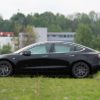
It’s a great time to be an electric car company in China! In the last year, there has been increased regulation and interest from the government. This has led to more innovation, competition, and consumer awareness of EVs. There are now over 20 companies that sell or plan on selling electric cars in China this year alone. That number is expected to grow exponentially as we move into 2020 when all automakers will need to produce at least 10% of their vehicles as battery-powered.
There are still some barriers for these companies: infrastructure needs improvement and public charging stations are not yet widespread enough. However, with so much happening right now it’s hard not to see how quickly things will change shortly.
The list of companies below is in alphabetical order.
BAIC EC-Series:

The BAIC EC-Series was first introduced in 2016 and is currently the best-selling electric car in China. The model has a range of 250km and can reach up to 80% charge in just 30 minutes. In 2018, BAIC sold over 100,000 units of the EC-Series.
BYD e6:

The BYD e6 was introduced in 2010 and is one of the longest-range EVs on the market with a distance of 400km per charge. It’s primarily used as a taxi or rideshare vehicle but is also available for private purchase. BYD plans to release a new, updated model of the e6 in 2020.
Chevrolet Volt:
The Chevrolet Volt is a plug-in hybrid electric car that was first released in 2010. It has a range of 53km on electric power alone and can go up to 1,000km on a full tank of gas. In 2019, General Motors announced that they would be ceasing production of the Volt.
GAC Trumpchi GE3:
The GAC Trumpchi GE3 was released in 2018 and is one of the most affordable EVs on the market. It has a range of 300km and charges in just 2.5 hours.
JAC iEV7S:
The JAC iEV7S was first introduced in 2016 and was the first car to be mass-produced by a Chinese automaker. It has a range of 200km and can charge up to 80% in 30 minutes.
Nio ES8:
The Nio ES8 is a 7-seater SUV that was released in 2018. It has a range of 355km and can go from 0 to 100km/h in just 4.4 seconds. In 2019, Nio released a smaller, cheaper model called the ES6 which has a range of 510km.
Tesla Model S:
The Tesla Model S was first introduced in 2012 and is still one of the most popular EVs on the market. It has a range of over 500km and can go from 0 to 100km/h in just 2.5 seconds. Tesla plans to release a new, updated Model S in 2020.
Volkswagen e-Golf:
The Volkswagen e-Golf was first introduced in 2014 and is currently the only electric car offered by the automaker. It has a range of 190km and can charge up to 80% in under an hour. In 2019, Volkswagen announced that they would be ceasing production of the e-Golf.
Xiaomi MI electric:
Xiaomi is better known as a smartphone company but they released their first EV in 2019. The Xiaomi MI electric has a range of 300km and can charge up to 80% in just 30 minutes.
Zotye E20:
The Zotye E20 is one of the most affordable EVs on the market with a price tag of just over USD 10,000. It has a range of 200km and charges in 2-3 hours. Zotye plans to release a new, updated model of the E20 in 2020.
Benefits Of Electric Cars:
Reduced environmental impact:
Electric cars produce zero emissions, which is great for the environment. By switching to electric vehicles, we can reduce pollution and improve air quality.
Reduced dependence on oil:
Electric cars don’t require any gasoline or oil, so we can reduce our dependence on foreign oil suppliers. This is especially important given the current geopolitical situation in the Middle East.
Increased energy security:
Electric cars can be plugged into the grid, so we can increase our energy security and reduce our reliance on fossil fuels. This is an important step towards creating a more sustainable future.
Increased fuel efficiency:
Electric cars are much more efficient than gas-powered cars, and they can save you a lot of money on fuel costs.
Reduced maintenance costs:
Electric cars require much less maintenance than gas-powered cars, which can save you a lot of money in the long run.
Increased convenience:
Electric cars can be plugged into any standard outlet, so you don’t have to go to a gas station to fill up. This is a major convenience advantage over gas-powered cars.
Reduced environmental impact:
Gas-powered cars produce harmful emissions that contribute to climate change. Electric cars produce zero emissions, so they are much better for the environment.
Increased safety:
Electric cars are much safer than gas-powered cars, and they have far fewer moving parts. This makes them less likely to malfunction or catch fire in an accident.
Increased sustainability:
Electric cars can be powered by renewable energy sources like solar and wind power, so they are much more sustainable than gas-powered cars.
Reduced emissions:
Electric cars produce zero emissions, which is great for the environment. By switching to electric vehicles, we can reduce pollution and improve air quality.
Conclusion:
These are just some of the electric car companies in China that are making a big impact in the industry. With so much happening right now, it’s hard to see how quickly things will change shortly.





